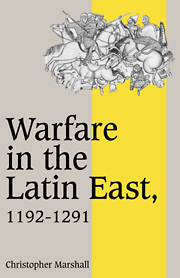Book contents
- Frontmatter
- Dedication
- Contents
- List of Illustrations
- Acknowledgements
- List of abbreviations
- Map
- Introduction: the Study of Warfare in the Latin East
- Chapter 1 Warfare and the History of the Latin East, 1192-1291
- Chapter 2 The Latin Armies
- Chapter 3 Castles and Strongpoints
- Chapter 4 Battles
- Chapter 5 Raiding Expeditions
- Chapter 6 Sieges
- Conclusion
- Appendix Scouts, Spies and Traitors
- Bibliography
- Index
Appendix - Scouts, Spies and Traitors
Published online by Cambridge University Press: 07 September 2023
- Frontmatter
- Dedication
- Contents
- List of Illustrations
- Acknowledgements
- List of abbreviations
- Map
- Introduction: the Study of Warfare in the Latin East
- Chapter 1 Warfare and the History of the Latin East, 1192-1291
- Chapter 2 The Latin Armies
- Chapter 3 Castles and Strongpoints
- Chapter 4 Battles
- Chapter 5 Raiding Expeditions
- Chapter 6 Sieges
- Conclusion
- Appendix Scouts, Spies and Traitors
- Bibliography
- Index
Summary
In all aspects of warfare, the more prudent Latin and Muslim commanders recognised the potential consequences of being ill-informed about an enemy’s movements and plans, and they therefore sought to obtain as much information as possible about their opponents. This could be done in three ways. First, members of the army could be dispatched to carry out a reconnaissance. Secondly, men could attempt to infiltrate an enemy force. Contemporary accounts do not always make a clear distinction between these two methods; terms such as ‘coreors’ and ‘espies’ seem to be largely interchangeable. But one can usually distinguish, if only by inference, between scouting and more covert forms of activity. Thirdly, members of the opposing army could be persuaded to provide information. All of these methods were used, and with a fair degree of success, during this period.
The employment of scouts by Christian armies has already been considered. Their functions would have included both foraging (as in a raid against Sidon in 1217—18, for example) and reporting on any hostile presence in the area. The turcopoles appear to have performed an important role on reconnaissance. Muslim armies also used scouts to report on the whereabouts and activities of Christian forces. As with their Christian counterparts, they had to perform both reconnaissance and raiding duties. In July 1221, for example, as the army of the Fifth Crusade progressed southwards towards Mansurah, Muslim scouts were positioned on both sides of the Nile. They not only observed the movements of the crusader army; they also tried, unsuccessfully, to inflict damage on it. We shall return to the work of Muslim scouts later, when some of the events before the battle of Gaza in 1239 are considered; they show careful use of both scouts and spies by the Muslim sultan and his military commander.
Spies were concerned with the covert gathering of intelligence from within an opposing army. They had the potential to obtain far more information than would be available to the scouts. The latter might only report an army’s current location; a spy, on the other hand, could discover where the army intended to go and, even more important, what it intended to do.
- Type
- Chapter
- Information
- Warfare in the Latin East, 1192–1291 , pp. 262 - 271Publisher: Cambridge University PressPrint publication year: 1992



